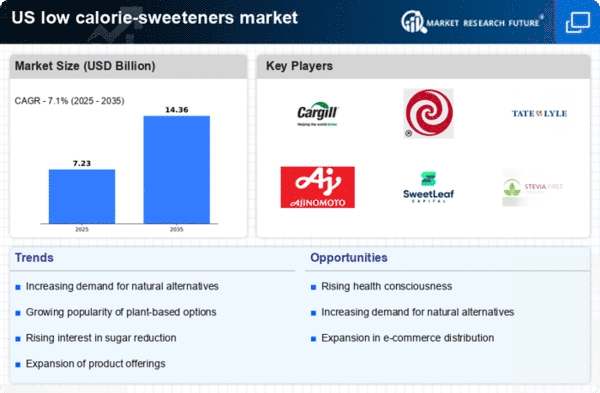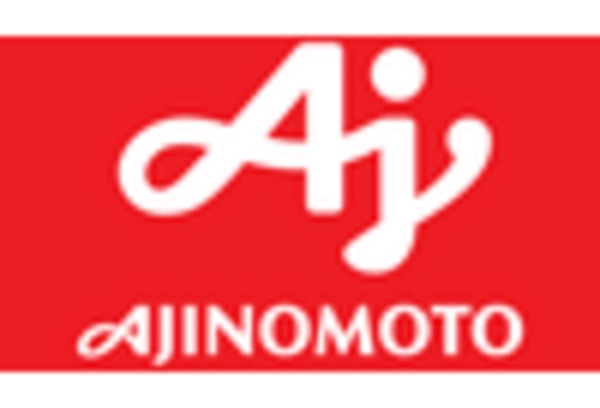Rising Obesity Rates
The increasing prevalence of obesity in the US has catalyzed a shift towards healthier dietary choices, thereby propelling the low calorie-sweeteners market. According to the Centers for Disease Control and Prevention (CDC), approximately 42.4% of adults in the US were classified as obese in 2017-2018. This alarming statistic has prompted consumers to seek alternatives to traditional sugars, which are often linked to weight gain. As a result, the demand for low calorie-sweeteners has surged, with the market projected to reach $2.5 billion by 2026. This trend indicates a growing awareness of the health implications associated with high sugar consumption, further driving the low calorie-sweeteners market.
Growing Awareness of Health Benefits
There is a burgeoning awareness among consumers regarding the health benefits associated with low calorie-sweeteners, which is significantly influencing the low calorie-sweeteners market. Many consumers are becoming more informed about the potential health risks of excessive sugar consumption, including diabetes and heart disease. This awareness is leading to a shift in purchasing behavior, with consumers actively seeking products that contain low calorie-sweeteners. The market is projected to witness a growth rate of 6% annually as more individuals prioritize health-conscious choices. This trend indicates a broader movement towards healthier lifestyles, which is likely to continue shaping the low calorie-sweeteners market.
Increased Demand for Sugar Alternatives
The low calorie-sweeteners market is experiencing a notable uptick in demand for sugar alternatives, driven by consumers' desire to reduce sugar intake without sacrificing taste. The American Heart Association recommends limiting added sugars to no more than 6 tsp for women and 9 tsp for men daily. This recommendation has led to a significant shift in consumer behavior, with many opting for low calorie-sweeteners as a viable substitute. In 2025, the market is expected to grow at a CAGR of 5.5%, reflecting the increasing acceptance of these products in various food and beverage applications. This trend underscores the evolving preferences of consumers, which are shaping the low calorie-sweeteners market.
Regulatory Support for Healthier Products
Regulatory bodies in the US are increasingly supporting the development and use of low calorie-sweeteners, which is positively impacting the low calorie-sweeteners market. Initiatives aimed at reducing sugar consumption have led to favorable regulations that encourage the use of these sweeteners in food products. For instance, the FDA has approved several low calorie-sweeteners for use in food and beverages, which has bolstered consumer confidence in these products. This regulatory support is expected to facilitate market growth, with projections indicating a potential increase in market size by 7% over the next five years. This trend highlights the role of government policies in shaping the low calorie-sweeteners market.
Expansion of Food and Beverage Applications
The versatility of low calorie-sweeteners is driving their expansion across various food and beverage applications, thereby enhancing the low calorie-sweeteners market. Manufacturers are increasingly incorporating these sweeteners into a wide range of products, including baked goods, dairy items, and beverages, to cater to the growing demand for healthier options. In 2025, the market is anticipated to reach $3 billion, reflecting the increasing innovation in product formulations. This expansion is indicative of the food industry's response to consumer preferences, which are increasingly leaning towards low-calorie and low-sugar alternatives. As such, the low calorie-sweeteners market is likely to benefit from this trend.
















